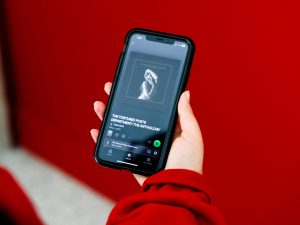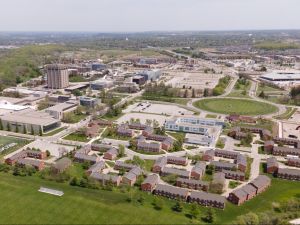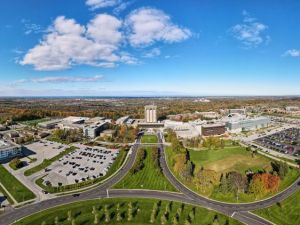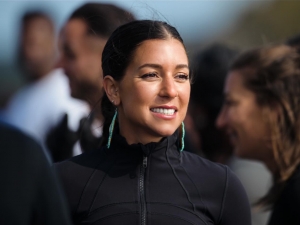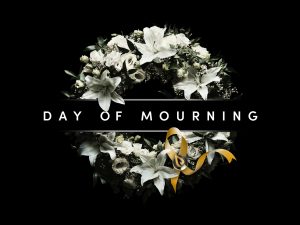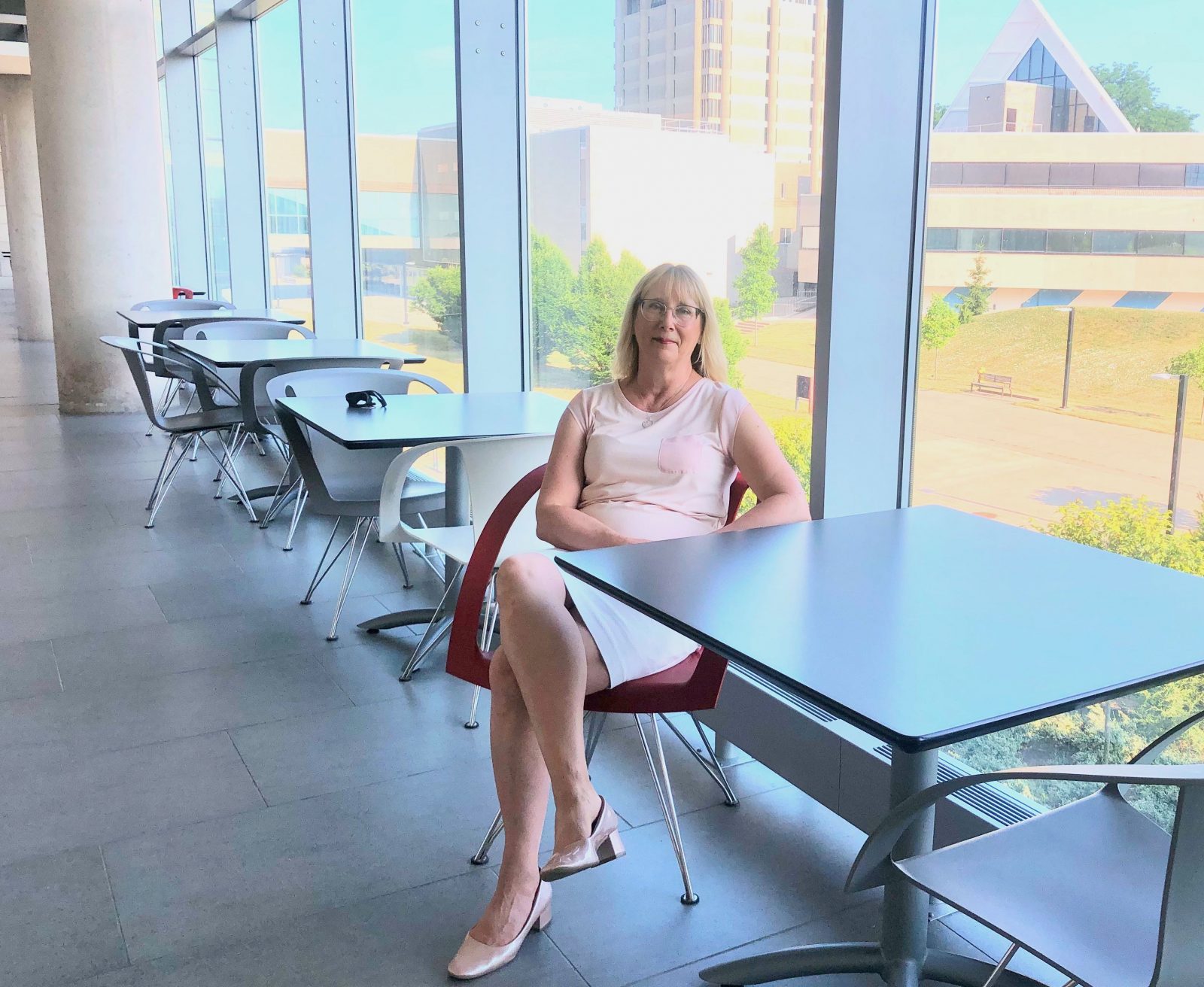 Lynn Wells in her new home campus: “The university sector is at a transformational moment… (and) Brock is poised to be a leader in the next stage of the evolution of university education in this country.”
Lynn Wells in her new home campus: “The university sector is at a transformational moment… (and) Brock is poised to be a leader in the next stage of the evolution of university education in this country.”When Lynn Wells left Alberta this spring to become Brock University’s new Provost and Vice-President, Academic, it was also a homecoming. She hails from the Essex County area of Ontario, and her own higher education also came in this province: PhD (English) from Western University (1997), MA (English) from York University (1987), and Honours BA (English/French Studies) from York (1986, Summa Cum Laude).
But the academic leader forged much of her career navigating senior roles at post-secondary institutions across western Canada. Before joining Brock, she had been Associate Vice-President, Students and Teaching at Edmonton’s MacEwan University since 2018, and prior to that Wells spent more than a decade in senior roles at First Nations University of Canada and the University of Regina.
Now she is focused on contributing to the success of her new institution, and as she worked her way through Week 1 on the job, Wells made time to reflect on a few questions from the Brock News.
• • • • •
Why were you attracted to this opportunity at Brock?
There were many reasons. First, I was drawn by Brock’s strategic directions, which bring together what, for me, are the critical elements of the modern Canadian university: a focus on the holistic student experience; promotion of teaching excellence and innovation; a thriving and heterogeneous research culture; active community and regional engagement; and an authentic commitment to the principles of equity, diversity and inclusion, including reconciliation with Indigenous peoples.
Second, throughout my career, I have been attracted by institutions with a clear sense of their historical mission that are at the same time open to positive change. The university sector is at a transformational moment, given the sea change brought about by the Covid-19 pandemic and the burgeoning consciousness of inequities around race, gender, sexual identity and socio-economic status. Brock is poised to be a leader in the next stage of the evolution of university education in this country, with the capacity to address some of the most pressing issues facing people in the Niagara Region, Canada and the world.
Finally, the opportunity to join Brock was also an opportunity to return home, given my roots in southwestern Ontario.
What excites you most as you settle into this influential leadership position at your new university?
I’m excited to get to know everyone in the Brock community: faculty, staff, students and community stakeholders. For the first few months I’ll be meeting with as many people as possible, to learn from them about their dreams and aspirations for Brock, and how, as Provost, I can support them in achieving those goals.
There are many compelling priorities that will come to the fore in the year ahead of us: developing new academic programs, enhancing our research profile, expanding our institutional footprint, and supporting students and faculty through the challenges of delivering classes largely online during the pandemic period. We will need to position Brock to play an important role in the economic recovery of the region, and to serve as a site of free and informed dialogue around our most urgent social issues.
Community engagement is a focus of mine, and I plan to be active in getting to know leaders from all sectors to hear about how Brock can continue to build relationships with those stakeholders. The preparation for the Canada Games is a potent reminder of a time not too far in the future when we’ll be able to welcome the community back onto our campus.
What opportunities should universities be anticipating as the country strives to emerge from under a punishing pandemic?
Universities are positioned to serve as the forum for free discussion of what social and economic changes will be needed for a full, healthy recovery following the pandemic. Universities bring together inquisitive, thoughtful people from many different disciplines: scientists and philosophers, teachers and artists, public health professionals and social theorists, and many more.
This unique mix of perspectives, coupled with academic freedom, makes it possible for universities to engage in respectful debate, to consider difficult issues from multiple viewpoints, and to propose creative solutions founded in the public good. Brock’s motto, Surgite, embodies this forward-looking stance, and our institutional mission is geared towards positive momentum.
What are some of the more pressing issues for faculty members as regards the dramatic changes that have occurred over the past few months?
Now that the immediacy of the shift to online instruction has passed, faculty members can reflect on this change and gain valuable lessons from it. As instructors, what we take away from this experience will certainly inform our teaching practice when things return to “normal”. We will have learned about alternative ways to engage students, to evaluate learning, and to provide truly accessible education.
As for research, despite the disruption to core activities, including conference travel, we must continue to develop as researchers, scholars and creative artists under these new conditions. We must rethink how we evaluate productivity in research, scholarship and creative activity.
In these challenging times, what do you say to encourage students about their future?
As the mother of two university students, I’ve had an opportunity to see first-hand the impacts of the pandemic situation on them: the sudden adjustment to online learning; the cancellation of projects, travel, experiential learning, employment, and training; the loss of a shared community life, with the chance to meet new people and enjoy spending time together.
I know that many students are struggling with a diminished sense of their own future, which has created new and troubling mental health issues. I’m also aware that students are deeply affected by the social justice issues that have become vivid during the pandemic, especially racial inequality.
The challenges faced by students, both undergraduate and graduate, are real and profound. During these difficult times, I urge students to seek out support when they need it, and to focus on self-care. I ask students to communicate openly, to help us understand as university leaders what we can do to help them throughout this difficult period. As Provost, I want to engage students in as many ways as possible to generate new ideas and initiatives that will lead to positive changes during and after this unprecedented time.
How do you see the integration of research activities into the experiences of undergraduate and graduate students?
Integrating research activity into student experiences — both at the undergraduate and graduate levels — is core to the modern university, and is at the intersection point for Brock’s own strategic priorities for research, teaching and community engagement. By engaging students in our scientific, scholarly, creative and community-based projects, we provide them with experiential learning opportunities that enhance their academic outcomes and prepare them for successful employment. Not only do the students benefit, but researchers gain as well, through support for their research programs.
As you return to your native Ontario, what differences do you see in terms of challenges that universities face in various regions?
I started working in university administration in the 1980s, when I was an assistant to the President of York University for four years. Since that time, I’ve been a professor and university administrator in a number of institutions in Saskatchewan and Alberta.
While there are some regional differences, I’ve found that universities across Canada face similar challenges, especially right now: economic upheaval caused by the pandemic; sudden changes to teaching and learning, with the concomitant impacts on student mental health; disruptions to research programs and faculty development; and difficulties of sustaining institutional identity and engagement when we can’t be together physically on campus. As Provost, I see it as part of my role to model a sense of optimism about the future — not a disingenuous cheerfulness, but a genuine confidence that Brock has the people and the values to weather the current crisis and emerge stronger in the end.
